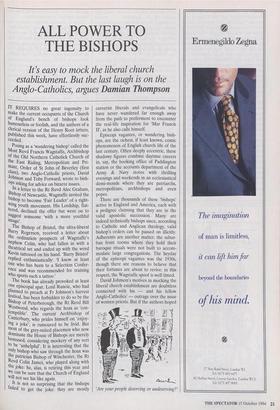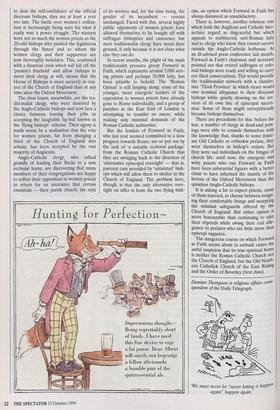ALL POWER TO THE BISHOPS
It's easy to mock the liberal church establishment. But the last laugh is on the
Anglo-Catholics, argues Damian Thompson IT REQUIRES no great ingenuity to make the current occupants of the Church of England's bench of bishops look humourless or foolish, and the authors of a clerical version of the Henry Root letters, published this week, have effortlessly suc- ceeded.
Posing as a 'wandering bishop' called the Most Revd Francis Wagstaffe, Archbishop of the Old Northern Catholick Church of the East Riding, Metropolitan and Pri- mate, Order of St John of Beverley (first class), two Anglo-Catholic priests, David Johnson and Toby Forward, wrote to bish- °Ps asking for advice on bizarre issues. In a letter to the Rt Revd Alec Graham, Bishop of Newcastle, Wagstaffe invited the bishop to become 'Fair Leader' of a right- wing youth movement. His Lordship, flat- tered, declined the offer but went on to suggest someone 'with a more youthful image'. The Bishop of Bristol, the ultra-liberal Bang Rogerson, received a letter about the ordination prospects of Wagstaffe's nephew Colin, who had fallen in with a theatrical set and ended up with the word Kevin tattooed on his hand, 'Barry Bristol' replied enthusiastically: 'I know at least One who has been to a Selection Confer- ence and was recommended for training who sports such a tattoo.' The book has already provoked at least One episcopal spat, Lord Runcie, who had Planned to preach at Fr Johnson's harvest festival, has been forbidden to do so by the Bishop of Peterborough, the Rt Revd Bill Westwood, who regards the hoax as 'con- temptible'. The current Archbishop of Canterbury, who prides himself on 'enjoy- ing a joke', is rumoured to be livid. But most of the grey-suited placemen who now dominate the House of Bishops are merely bemused, considering mockery of any sort to be 'unhelpful'. It is interesting that the Only bishop who saw through the hoax was the patrician Bishop of Winchester, the Rt Revd Colin James, who played along with the joke: he, alas, is retiring this year and we can be sure that the Church of England will not see his like again. It is not so surprising that the bishops failed to get the joke: they are mostly careerist liberals and evangelicals who have never wandered far enough away from the path to preferment to encounter the real-life inspiration for 'Mar Francis II', as he also calls himself.
Episcopi vagantes, or wandering bish- ops, are the richest, if least known, comic phenomenon of English church life of the last century. Often deeply eccentric, these shadowy figures combine daytime careers in, say, the booking office of Paddington station or the accounts department of the Army & Navy stores with thrilling evenings and weekends in an ecclesiastical demi-monde where they are patriarchs, metropolitans, archbishops and even popes.
There are thousands of these 'bishops' active in England and America, each with a pedigree claiming that they are in the valid apostolic succession. Many are indeed technically bishops since, according to Catholic and Anglican theology, valid bishop's orders can be passed on illicitly. Adherents are another matter: the subur- ban front rooms where they hold their baroque rituals were not built to accom- modate large congregations. The heyday of the episcopi vagantes was the 1930s, though there are reasons to believe that their fortunes are about to revive: in this respect, the Wagstaffe spoof is well timed.
David Johnson's motives in mocking the liberal church establishment are doubtless connected with his — and his fellow Anglo-Catholics' — outrage over the issue of women priests. But if the authors hoped 'Are your people deserving or undeserving?' to dent the self-confidence of the official diocesan bishops, they are at least a year too late. The battle over women's ordina- tion is increasingly being seen for what it really was: a power struggle. The winners were not so much the women priests as the 20-odd bishops who pushed the legislation through the Synod and to whom the women clergy and their supporters are now thoroughly beholden. This, combined with a financial crisis which will kill off the 'parson's freehold' and allow bishops to move their clergy at will, means that the House of Bishops is more securely in con- trol of the Church of England than at any time since the Oxford Movement.
The clear losers, meanwhile, are the tra- ditionalist clergy, who were deserted by the Anglo-Catholic bishops and now face a choice between leaving their jobs or accepting the laughable fig-leaf known as the 'flying bishops' scheme. Their agony is made worse by a realisation that the vote for women priests, far from plunging a third of the Church of England into schism, has been accepted by the vast majority of Anglicans.
Anglo-Catholic clergy, who talked grandly of leading their flocks to a new ecclesial home, are discovering that many members of their congregations are happy to soften their opposition to women priests in return for an assurance that certain essentials — their parish church, the style of its services and, for the time being, the gender of its incumbent — remain unchanged. Faced with this, several highly public opponents of women priests have allowed themselves to be bought off with suffragan bishoprics and canonries; but most traditionalist clergy have stood their ground, if only because it is not clear what else they can do.
In recent months, the plight of the main traditionalist pressure group Forward in Faith, which represents around 2,000 serv- ing priests and perhaps 50,000 laity, has been pitiable to behold. The 'Roman Option' is still limping along: some of the younger, more energetic leaders of the opposition to women priests have already gone to Rome individually, and a group of parishes in the East End of London is attempting to transfer en masse, while making only minimal demands of the Roman Catholic authorities.
But the leaders of Forward in Faith, who last year seemed committed to a slow progress towards Rome, are so put out by the lack of 'a suitable ecclesial package' from the Roman Catholic Church that they are swinging back in the direction of `alternative episcopal oversight' — that is, pastoral care provided by 'untainted' bish- ops which will allow them to shelter in the Church of England. The problem here, though, is that the only alternative over- sight on offer is from the two flying bish- ops, an option which Forward in Faith has always dismissed as unsatisfactory.
There is, however, another solution: one which both the Anglican and Catholic hier- archies regard as disgraceful but which appeals to embittered, anti-Roman laity and to clergy who know they cannot survive outside the Anglo-Catholic hothouse. At an ill-advised press conference last month, Forward in Faith's chairman and secretary pointed out that retired suffragan or colo- nial bishops were ready and willing to carry out illicit consecrations. This would provide the traditionalist network with a clandes- tine 'Third Province' in which vicars would owe nominal allegiance to their diocesan bishops while quietly drawing on the ser- vices of its own line of episcopal succes- sion. Some of them might surreptitiously become bishops themselves.
There are precedents for this: before the war, a number of clergy in dead-end post- ings were able to console themselves with the knowledge that, thanks to some itiner- ant Old Catholic or orthodox prelate, they were themselves in bishop's orders. But they were sad individuals on the fringes of church life: until now, the energetic and witty priests who run Forward in Faith have been substantial figures with a better claim to have inherited the mantle of the heroes of the Oxford Movement than the spineless Anglo-Catholic bishops.
It is asking a lot to expect priests, many of them married, to choose between resign- ing their comfortable livings and accepting the minimal safeguards offered by the Church of England. But either option is more honourable than continuing to take their stipends while owing their real alle- giance to prelates who are little more than episcopi vagantes. The dangerous course on which Forward in Faith seems about to embark raises the awful suspicion that its true spiritual home is neither the Roman Catholic Church nor the Church of England, but the Old North- ern Catholick Church of the East Riding and the Order of Beverley (first class).
Damian Thompson is religious affairs corre- spondent of the Daily Telegraph.
`We must never let "never letting it happen again" happen again.'



























































 Previous page
Previous page